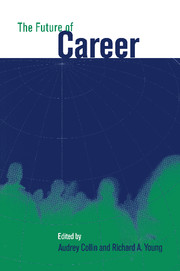Crossref Citations
This Book has been
cited by the following publications. This list is generated based on data provided by Crossref.
Luzzo, Darrell Anthony
and
MacGregor, Marilyn Wright
2001.
Practice and Research in Career Counseling and Development—2000.
The Career Development Quarterly,
Vol. 50,
Issue. 2,
p.
98.
Cohen, Laurie
and
Mallon, Mary
2001.
My Brilliant Career?.
International Studies of Management & Organization,
Vol. 31,
Issue. 3,
p.
48.
Savickas, Mark L.
2001.
The Next Decade in Vocational Psychology: Mission and Objectives.
Journal of Vocational Behavior,
Vol. 59,
Issue. 2,
p.
284.
Meijers, F.
2002.
Career Learning in a Changing World: The Role of Emotions.
International Journal for the Advancement of Counselling,
Vol. 24,
Issue. 3,
p.
149.
Hartung, Paul J.
2002.
Cultural Context in Career Theory and Practice: Role Salience and Values.
The Career Development Quarterly,
Vol. 51,
Issue. 1,
p.
12.
Lounsbury, John W.
Loveland, James M.
Sundstrom, Eric D.
Gibson, Lucy W.
Drost, Adam W.
and
Hamrick, Frances L.
2003.
An Investigation of Personality Traits in Relation to Career Satisfaction.
Journal of Career Assessment,
Vol. 11,
Issue. 3,
p.
287.
Chen, Charles P.
2003.
Integrating Perspectives in Career Development Theory and Practice.
The Career Development Quarterly,
Vol. 51,
Issue. 3,
p.
203.
Bourke, Ann
2003.
The Dream of Being a Professional Soccer Player.
Journal of Sport and Social Issues,
Vol. 27,
Issue. 4,
p.
399.
Szymanski, Edna Mora
and
Vancollins, Jeff
2003.
Career Development of People with Disabilities: Some New and Not-So-New Challenges.
Australian Journal of Career Development,
Vol. 12,
Issue. 1,
p.
9.
Strong, Tom
2003.
Getting curious about meaning-making in counselling (1)1.
British Journal of Guidance & Counselling,
Vol. 31,
Issue. 3,
p.
259.
Swanson, Jane L.
2003.
Understanding Midcareer Development: From Whose Perspective?.
The Counseling Psychologist,
Vol. 31,
Issue. 2,
p.
212.
Chen, Charles P.
2004.
Positive Compromise: A New Perpective for Career Psychology.
Australian Journal of Career Development,
Vol. 13,
Issue. 2,
p.
17.
Morrell, Kevin
2004.
Enhancing effective careers thinking: scripts and Socrates.
British Journal of Guidance & Counselling,
Vol. 32,
Issue. 4,
p.
547.
Loogma, Krista
Ümarik, Meril
and
Vilu, Raivo
2004.
Identification‐flexibility dilemma of IT specialists.
Career Development International,
Vol. 9,
Issue. 3,
p.
323.
Scott, Heather K.
2004.
Reconceptualizing the Nature and Health Consequences of Work-Related Insecurity for the New Economy: The Decline of Workers' Power in the Flexibility Regime.
International Journal of Health Services,
Vol. 34,
Issue. 1,
p.
143.
Greene, Richard Tabor
2004.
The Dynamics of Interesting Careers -- 64 Games that Your Life and Work are and 64 Ways to Play Those Game Well from People Having Superb Careers.
SSRN Electronic Journal,
Blustein, David L.
2004.
Moving from the Inside Out.
The Counseling Psychologist,
Vol. 32,
Issue. 4,
p.
603.
Schaefer, Bianca M.
Friedlander, Myrna L.
Blustein, David L.
and
Maruna, Shadd
2004.
The Work Lives of Child Molesters: A Phenomenological Perspective..
Journal of Counseling Psychology,
Vol. 51,
Issue. 2,
p.
226.
Schultheiss, Donna E. Palladino
2005.
Qualitative Relational Career Assessment: A Constructivist Paradigm.
Journal of Career Assessment,
Vol. 13,
Issue. 4,
p.
381.
El‐Sawad, Amal
2005.
Becoming a lifer? Unlocking career through metaphor.
Journal of Occupational and Organizational Psychology,
Vol. 78,
Issue. 1,
p.
23.



